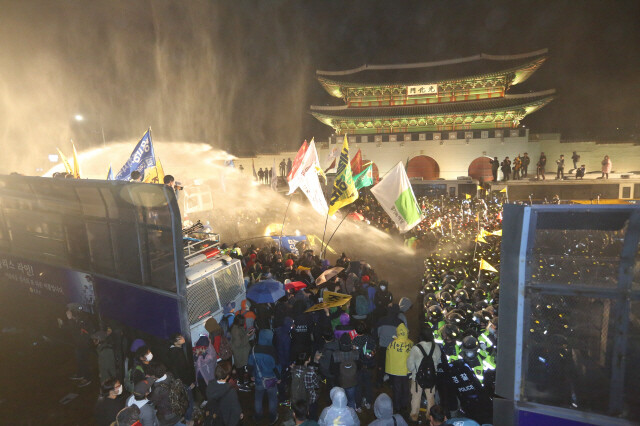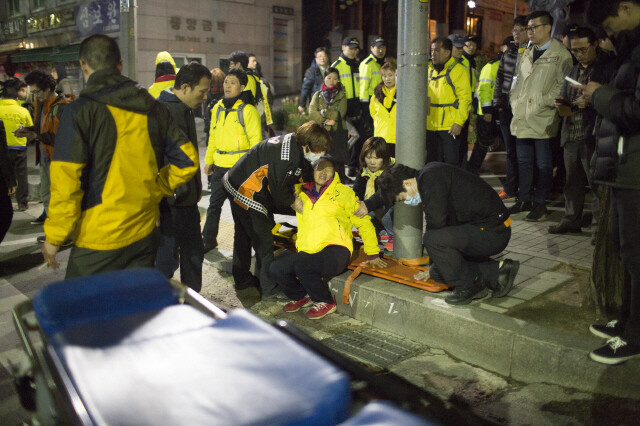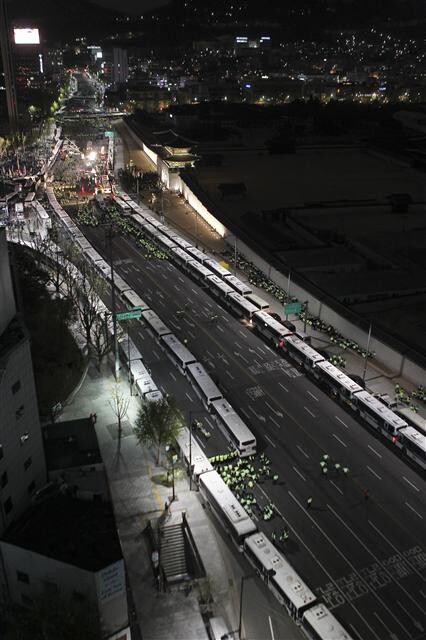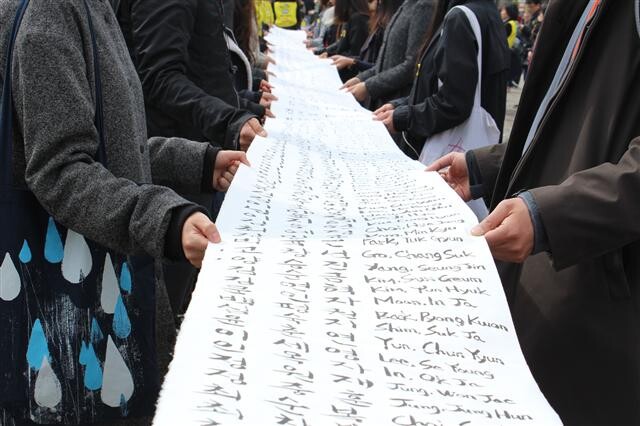hankyoreh
Links to other country sites 다른 나라 사이트 링크
[Editorial] Excessive violence by police at Sewol anniversary events

With South Korean citizens organizing a series of events to commemorate the anniversary of the tragic sinking of the Sewol ferry, the police seemed resolved to brutally put down these peaceful demonstrations and marches. The same government that did such a poor job of rescuing passengers on the ferry is wielding a terrible power as it tramples on the grief of the victims’ families and other South Koreans and as it suppresses the justified appeals for the truth.
During a memorial event on Apr. 16, the first anniversary of the sinking, the police responded with excessive force, sealing off Gwanghwamun Square behind a barricade of buses and firing tear gas at marchers. During this process, the mother of one student who died in the sinking sustained four broken ribs.

During the nationwide public assembly for the anniversary of the Sewol tragedy on Apr. 18, the police mustered around 470 vehicles and 13,700 officers to completely wall of Gyeongbok Palace, Gwanghwamun Square, and Sejong street intersection.
The police indiscriminately fired water cannons and tear gas and hauled off around a hundred members of the victims’ families who tried to protest the hard-line response. Reportedly, the police dragged off a university student by her hair. These are grim scenes that evoke the days before democratization.

Citing the inconvenience to motorists caused by protestors marching down the streets and violence including attacks on police officers, the police insist that their harsh response was unavoidable. But there is nothing unusual about rerouting traffic in downtown Seoul because of various events, such as the marathon that was held last weekend.
Mourning a national tragedy and calling for a thorough investigation is protected by freedom of expression. If anything, in a democracy, this kind of expression ought to be protected more than any other kind of event.
If it were not for the excessive police response, no confrontations or physical clashes would have occurred in the first place. Even worse, using bus barricades to cordon off traffic and block demonstrations is a clear violation of the constitution, according to a decision by the Constitutional Court. The explanation offered by the police is no more than an excuse, and a flimsy one at that.
“The unnecessary use of force by South Korean police against families of the Sewol ferry tragedy is an insult to the victims and a violation of the rights to freedom of expression and peaceful assembly,” global human rights advocacy group Amnesty International said.
“The use of chemical irritants primarily to disperse peaceful protesters [. . . ] is unlawful under international legal standards,” the group also said.
It is mortifying to consider what the international community, which is observing the anniversary of the Sewol tragedy, will make of such a situation.
What’s the point of President Park diligently traveling to foreign countries? A single picture of police violently clamping down on citizens gathered together to mourn a national tragedy degrades South Korea’s international prestige at a single blow.
The surprisingly brutal attitude of the police would be inconceivable, were it not for the attitude with which the Park administration has responded to the Sewol disaster. If the government had made a sincere effort to get to the bottom of the tragedy, such a situation would never have occurred.
For an entire year after the accident, the government has stonewalled the launch of the Special Sewol Investigative Committee and delayed the salvaging of the sunken ferry. Finally, now that it is facing massive criticism and resistance, it has taken drastic measures to muzzle the public.
When these events are viewed in this light, it’s hard to shake the feeling that the rash behavior of the police was directed by, or at least received the tacit approval of, core figures in the current administration. The figures who came up with the idea of suppressing the protests must be identified and held responsible.

Please direct questions or comments to [english@hani.co.kr]

Editorial・opinion
![[Column] Park Geun-hye déjà vu in Yoon Suk-yeol [Column] Park Geun-hye déjà vu in Yoon Suk-yeol](https://flexible.img.hani.co.kr/flexible/normal/500/300/imgdb/original/2024/0424/651713945113788.jpg) [Column] Park Geun-hye déjà vu in Yoon Suk-yeol
[Column] Park Geun-hye déjà vu in Yoon Suk-yeol![[Editorial] New weight of N. Korea’s nuclear threats makes dialogue all the more urgent [Editorial] New weight of N. Korea’s nuclear threats makes dialogue all the more urgent](https://flexible.img.hani.co.kr/flexible/normal/500/300/imgdb/original/2024/0424/7317139454662664.jpg) [Editorial] New weight of N. Korea’s nuclear threats makes dialogue all the more urgent
[Editorial] New weight of N. Korea’s nuclear threats makes dialogue all the more urgent- [Guest essay] The real reason Korea’s new right wants to dub Rhee a founding father
- [Column] ‘Choson’: Is it time we start referring to N. Korea in its own terms?
- [Editorial] Japan’s rewriting of history with Korea has gone too far
- [Column] The president’s questionable capacity for dialogue
- [Column] Are chaebol firms just pizza pies for families to divvy up as they please?
- [Column] Has Korea, too, crossed the Rubicon on China?
- [Correspondent’s column] In Japan’s alliance with US, echoes of its past alliances with UK
- [Editorial] Does Yoon think the Korean public is wrong?
Most viewed articles
- 1[Guest essay] The real reason Korea’s new right wants to dub Rhee a founding father
- 2Why Korea shouldn’t welcome Japan’s newly beefed up defense cooperation with US
- 3[Column] ‘Choson’: Is it time we start referring to N. Korea in its own terms?
- 4New AI-based translation tools make their way into everyday life in Korea
- 5[Column] Park Geun-hye déjà vu in Yoon Suk-yeol
- 6Senior doctors cut hours, prepare to resign as government refuses to scrap medical reform plan
- 7Opposition calls Yoon’s chief of staff appointment a ‘slap in the face’
- 8Will NewJeans end up collateral damage in internal feud at K-pop juggernaut Hybe?
- 9Terry Anderson, AP reporter who informed world of massacre in Gwangju, dies at 76
- 10Thursday to mark start of resignations by senior doctors amid standoff with government